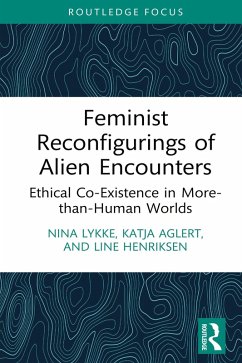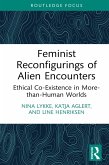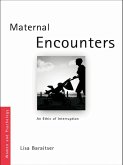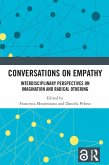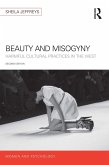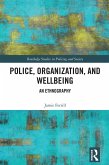Dieser Download kann aus rechtlichen Gründen nur mit Rechnungsadresse in A, B, BG, CY, CZ, D, DK, EW, E, FIN, F, GR, HR, H, IRL, I, LT, L, LR, M, NL, PL, P, R, S, SLO, SK ausgeliefert werden.
Donna Haraway, Professor Emerita, History of Consciousness and Feminist Studies, University of California, Santa Cruz, USA
A sensitive yet vibrant and sympathetically weird volume exploring queer ways to think of the less emphasized others of our world's occupants. The authors remind us that posthumanism deals with a host of alien and strange fabulations which have lived alongside us and existed for longer than us, in their own ways irreducible to anthropocentric philosophical capture. A beautiful and activism-inspiring book.
Patricia MacCormack, Professor of Continental Philosophy, Anglia Ruskin University, Cambridge, UK
With tenderness and vulnerability, the authors sincerely stretch their hands, hearts and minds out to meet and be met by alien others. In doing so they sculpt a post-human practice of kinship that is much needed in these petro-patriarchal times. Playful, thoughtful and committed, this book bridges theory, art, and creative writing, putting to use all these tools in such a way that readers will feel they can embark on alien journeys themselves.
Camila Marambio, PhD, Curator, Artist, Independent Researcher, Ensayos. Curator of the Chilean Pavillion Turba Tol Hol-Hol at the 59th Venice Art Biennale 2022
This book is a kin-spirited gathering of somatic and spectral desires to connect with mineralized, mucous-abundant and mysterious others beyond, and within, our different Earthly ways of being. It seeks out creative, epistemic hybridity through collective imaginings that tenderly nibble and glide, and poetically disrupt genres of writing, knowing, care, and companionability with other-than-human collaborators.
Susan Reid, PhD, University of Sydney, Australia, Cultural Theorist, Creative Researcher, Artist and Writer
Overturning expectations, the authors playfully and deconstructively employ both cognitive and affective techniques of estrangement and defamiliarization to undermine human exceptionalism and power, offering instead radically different, mutualistic practices of more-than-human companionships. For many readers, this startling and ambitious text will be an alien - yet highly productive - encounter in itself.
Margrit Shildrick, Guest Professor of Gender and Knowledge Production, Stockholm University, Sweden

